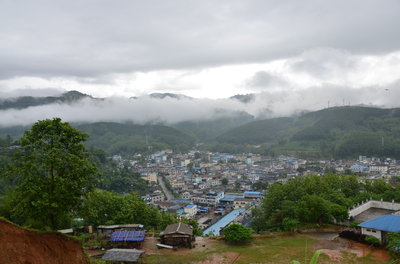




Burmese government forces are forging ahead with air and artillery strikes on positions around the de facto headquarters of armed ethnic rebels in northern Kachin state despite calls for a cease-fire, according to RFA’s reporters at the scene of the fighting Monday.
Two government fighter jets struck remnant ground forces of the Kachin Independence Army (KIA) near the Point-771 hilltop outpost which government forces took over on Dec. 30 near Laiza, the rebel headquarters, along the Burma-China border.
Two helicopters dropped supplies to government forces at the outpost as KIA troops were seen firing at the aircraft from the ground with machine guns.
As the helicopters came under fire, the fighter jets blasted KIA positions at the remote outpost on a hill, which can only be reached by aircraft.
The hilltop is crucial because the Burmese military and the KIA each controls part of the territory downhill.
On Sunday, government forces fired on KIA troops from the Point-771 outpost with artillery shells.
A day later, explosions could be felt from ground fighting at Tone-home-yan, about one mile (1.6 kilometers) from the key Lajayang area occupied by government forces.
Fighting between government troops and the KIA, which is demanding greater autonomy, has been going on every day in recent weeks, after a 17-year cease-fire collapsed in June 2011.
Several rounds of preliminary peace talks since then between the Burmese government and Kachin leaders have yielded little outcome.
Tens of thousands of ethnic Kachins have been displaced by the fighting.
La Nan, a KIA spokesman, said government troops attacked guerrilla hilltop outposts Monday morning and used fighter planes and helicopters in aerial attacks in the afternoon, according to the Associated Press news agency.
Burmese authorities have repeatedly denied that they are launching an attack on Laiza and have maintained that the military offensives are in response to KIA’s blocking the road to Lajayang, a vital logistics route.

UNFC
While government forces continued to pound KIA positions on Monday, members of the United Nationalities Federal Council, a coalition of 11 armed ethnic groups seeking greater autonomy in Burma, urged an end to the conflict in Kachin state.
The Kachin Independence Organization (KIO), the political wing of the KIA, is a member of the alliance, which began a four-day meeting of 45 ethnic leaders on Monday in Chiang Mai, Thailand to discuss national reconciliation.
“We are … trying to build an understanding between the government army and KIO,” Khun Okkar, one of two joint secretaries of the UNFC and chairman of the Pa-O National Liberation Organization said.
UNFC members also urged the government to declare a nationwide cease-fire and to settle disputes using political channels.
Efforts should be made to finalize cease-fire agreements with all resistance groups, the group said.
President Thein Sein, since coming to office in March 2011, has promised to work toward national reconciliation following decades of military rule in Burma, which has been embroiled in wars with ethnic groups in its borderlands since its founding in 1948.
He ordered a halt to military offensives against ethnic rebels last year and his government has signed cease-fire agreements with 10 ethnic groups, but fighting has been ongoing in Shan, Kayin, and Kachin states.
On Friday, newly elected leaders from the Karen National Union (KNU), which is fighting government forces in Kayin state and is a member of the UNFC, met with Thein Sein in Naypyidaw for peace talks.
Khun Okkar said that the UFCB’s meeting was crucial to gaining a unified stance among its members as the Burmese government proceeded with peace talks with Karens while intensifying its offensive against the Kachins.
“This meeting is about finding a way to foster unity,” he said.
“Right now, Thein Sein’s government is welcoming and trying to create a better relationship with the KNU, but is fighting forcefully against Kachin troops,” he said.
The Burmese army’s use of air strikes in the Kachin conflict has drawn condemnation from the U.N. and the U.S.
China has complained to Burma about three bombs landing on its territory during the air attacks on rebels.
Burmese opposition leader Aung San Suu Kyi, who championed ethnic minority rights when she came to office last year, on Sunday said she would not step in to help end the worsening conflict in Kachin state without government approval.
"It is up to the government. This case is being handled by the government at the moment," she told the Agence France-Presse news agency.
Reported by Ye Htet and Tin Aung Khine for RFA’s Burmese Service. Translated by Khet Mar. Written in English by Rachel Vandenbrink.